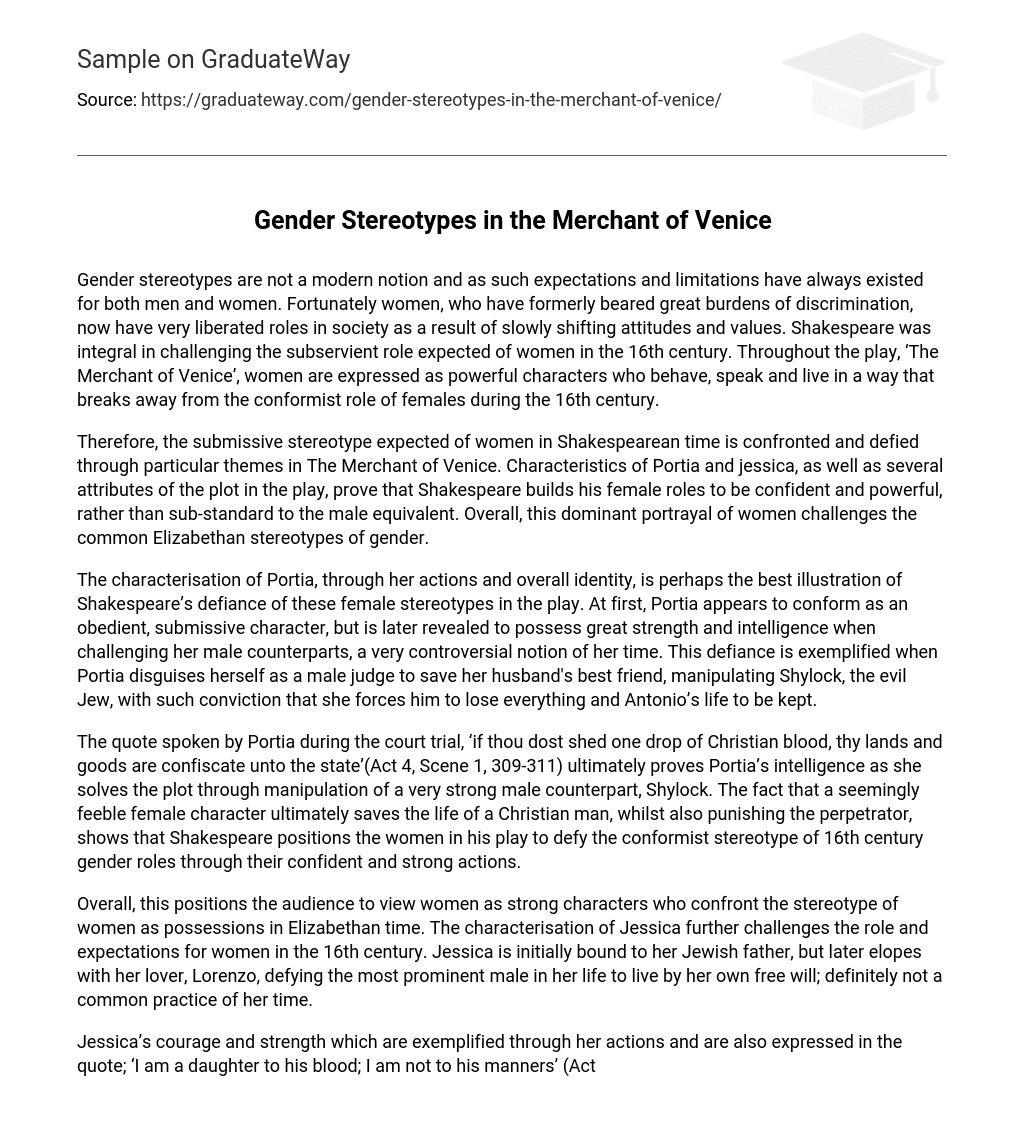Gender stereotypes are not a modern notion and as such expectations and limitations have always existed for both men and women. Fortunately women, who have formerly beared great burdens of discrimination, now have very liberated roles in society as a result of slowly shifting attitudes and values. Shakespeare was integral in challenging the subservient role expected of women in the 16th century. Throughout the play, ‘The Merchant of Venice’, women are expressed as powerful characters who behave, speak and live in a way that breaks away from the conformist role of females during the 16th century.
Therefore, the submissive stereotype expected of women in Shakespearean time is confronted and defied through particular themes in The Merchant of Venice. Characteristics of Portia and jessica, as well as several attributes of the plot in the play, prove that Shakespeare builds his female roles to be confident and powerful, rather than sub-standard to the male equivalent. Overall, this dominant portrayal of women challenges the common Elizabethan stereotypes of gender.
The characterisation of Portia, through her actions and overall identity, is perhaps the best illustration of Shakespeare’s defiance of these female stereotypes in the play. At first, Portia appears to conform as an obedient, submissive character, but is later revealed to possess great strength and intelligence when challenging her male counterparts, a very controversial notion of her time. This defiance is exemplified when Portia disguises herself as a male judge to save her husband’s best friend, manipulating Shylock, the evil Jew, with such conviction that she forces him to lose everything and Antonio’s life to be kept.
The quote spoken by Portia during the court trial, ‘if thou dost shed one drop of Christian blood, thy lands and goods are confiscate unto the state’(Act 4, Scene 1, 309-311) ultimately proves Portia’s intelligence as she solves the plot through manipulation of a very strong male counterpart, Shylock. The fact that a seemingly feeble female character ultimately saves the life of a Christian man, whilst also punishing the perpetrator, shows that Shakespeare positions the women in his play to defy the conformist stereotype of 16th century gender roles through their confident and strong actions.
Overall, this positions the audience to view women as strong characters who confront the stereotype of women as possessions in Elizabethan time. The characterisation of Jessica further challenges the role and expectations for women in the 16th century. Jessica is initially bound to her Jewish father, but later elopes with her lover, Lorenzo, defying the most prominent male in her life to live by her own free will; definitely not a common practice of her time.
Jessica’s courage and strength which are exemplified through her actions and are also expressed in the quote; ‘I am a daughter to his blood; I am not to his manners’ (Act 2, Scene3, 18-19). When Jessica says this as she betrays her father to secretly marry Lorenzo, it is clear that she possesses a strong sense of defiance and strength against this dominant male, showing that she is free to be her own person and is not going to let her life be run by her father.
This brave and controversial act by a young girl is in stark contrast to the expectations of 16th century society, revealing a hint of disrespect in the character of Jessica that is admired as a sign of her power. Overall, the actions of Jessica exemplify Shakespeare’s construction of women as powerful characters who defy the limitations of Elizabethan stereotypes. Finally, the rings sub-plot between Nerissa and Portia and their male counterparts, Graziano and Bassanio, additionally supports Shakespeare’s creation of women as powerful characters in his plays.
The women each give their husbands a ring as a symbol of their love, and tell them to never remove them to show their faithfulness. However, during the court trial, the disguised women convince the men to give up their rings and later confront them strongly about this. The quote from the text; ‘You would not have parted with the ring. What man is there so much unreasonable’ (Act 4, Scene 1, 202-203), suggests a tone of strength and courage in Portia’s voice. She is standing up to her husband, supposedly the most dominant person in Elizabethan relationships, which very much defies the stereotype of women in the 16th century.
Shakespeare represents women as powerful characters who overpower men and defy the expectations of their time, ultimately positioning the audience to challenge their own understanding of women and their capabilities. In conclusion, a thorough exploration of the play, The Merchant of Venice’, has proven that through the characterisation of both Portia and Jessica, as well as aspects of the play’s plot, Shakespeare challenges the subservient Elizabethan stereotype expected of women in the 16th century.
Strong themes in the play position women as powerful characters who confront and defy the conformist stereotype of women during the Elizabethan period. Therefore, Shakespeare has liberated the role of women in society, playing an integral part in shaping the anti-stereotypical world for both men and women which we live in today. Shakespeare’s positioning of women as powerful, free characters in his plays has been, perhaps, the most controversial example of strengthening and empowering women to date.





